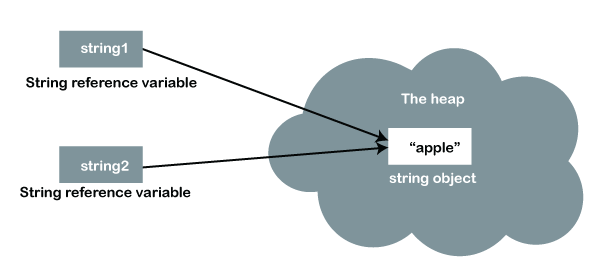The Development of Immutable String Handling: A Crucial Facet of Software Advancement
In the elaborate world of software program growth, the handling of unalterable strings stands as a keystone that has actually undergone significant development over time. From its simple beginnings to the facility challenges run into in very early executions, the journey of unalterable string manipulation has been an important aspect of software application engineering. As we navigate through the historic landscape of this fundamental idea, mapping the improvements, protection implications, and emerging trends, we locate ourselves at a juncture where the innate worth of understanding this development becomes progressively evident.
Origins of Immutable Strings
When designers sought to improve the integrity and security of information managing mechanisms,The concept of immutable strings traces back to the early days of programming languages. Immutable strings describe strings that can not be altered after they are produced. This essential concept was presented to attend to worries relating to information integrity and stop unexpected modifications to vital details stored as strings.

Moreover, unalterable strings add to enhancing the overall safety and security of software systems (Why are strings immutable in Java?). By preventing unauthorized events from damaging delicate string information, immutable strings help minimize the risk of data violations and unapproved access to secret information. This foundational concept proceeds to play a crucial duty in modern programming languages and remains a keystone of safe and robust software growth practices
Very Early Obstacles and Solutions
One of the primary difficulties in taking care of unalterable strings was taking care of memory efficiently. Furthermore, making certain that strings stayed unaltered verified to be complicated, specifically when multiple parts of the codebase required to accessibility and change data.
To resolve these obstacles, programmers started implementing information file encryption techniques to protect delicate info saved in immutable strings. By incorporating encryption and hashing techniques into the handling of unalterable strings, programmers significantly boosted the safety and dependability of data within software application systems.

Improvements in String Immutability
In software program growth, a remarkable evolution in the handling of immutable strings has arised with advancements in information encryption and hashing methods. By employing protected hash formulas like SHA-256 or cryptographic strategies such as AES security, programmers can make certain that delicate information kept in immutable strings remains secure and tamper-proof. These innovations have actually bolstered the integrity and confidentiality of information within applications, specifically in fields where information safety is extremely important, such as financing, cybersecurity, and healthcare.
Moreover, innovations in string immutability have led the way for enhanced efficiency optimization. Immutable strings permit for extra reliable memory monitoring and caching strategies, lowering the overhead related to regular string manipulations (Why are strings immutable in Java?). This optimization not only boosts the total responsiveness of software application applications but likewise adds to far better scalability and resource application
Protection Effects and Best Practices
With the structure laid by advancements in string immutability, recognizing the security implications and implementing finest techniques becomes extremely important in safeguarding delicate data within software application applications. Unalterable strings play an important duty in enhancing safety by preventing unapproved modifications to data, making sure information stability throughout the application's lifecycle. By making use of immutable strings, programmers can mitigate common vulnerabilities such as shot strikes, buffer overflows, and information tampering, which are typically manipulated Look At This by destructive actors to endanger systems.
This includes encrypting information at remainder and in transportation, executing proper image source accessibility controls, utilizing secure coding methods, and regularly upgrading software parts to patch recognized vulnerabilities. By integrating these protection steps and best methods into software program development procedures, organizations can better shield their data properties and reduce the risk of protection violations and information leaks.
Future Patterns in String Handling
In the middle of the ever-evolving landscape of software program development, the trajectory of string handling is poised to witness considerable innovations and innovations. Designers are checking out new algorithms and information frameworks to boost the speed and performance of string procedures.
Furthermore, an additional fad imminent is the combination of expert system (AI) and equipment learning (ML) in string handling tasks. AI-powered devices are being established to automate and simplify numerous string manipulation processes, resulting in boosted productivity and accuracy in software program development workflows.
Moreover, there is a growing emphasis on improving the safety elements of string managing with advanced file encryption techniques and protected coding techniques. As cyber hazards proceed to advance, ensuring the honesty and discretion of data within strings is coming More hints to be a leading priority for developers. By adopting durable protection procedures, such as security at remainder and en route, designers can reduce the risks related to string control vulnerabilities.
Final Thought
In verdict, the development of immutable string handling has actually been a crucial aspect of software program advancement, beginning from its beginnings to the improvements made recently. Early difficulties have been resolved via ingenious services, leading to better safety and security practices in taking care of strings. It is very important for programmers to stay upgraded on the most up to date fads in string immutability to ensure the effectiveness and safety and security of their software application applications.
Immutable strings refer to strings that can not be transformed after they are produced. Why are strings immutable in Java?. By protecting against unauthorized events from tampering with delicate string information, immutable strings aid reduce the threat of data breaches and unapproved accessibility to private details. By integrating encryption and hashing approaches into the handling of unalterable strings, designers considerably improved the safety and dependability of data within software systems
Immutable strings permit for much more reliable memory monitoring and caching approaches, reducing the overhead connected with constant string manipulations. Immutable strings play an essential duty in improving protection by preventing unauthorized adjustments to information, guaranteeing information stability throughout the application's lifecycle.